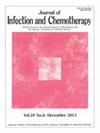The contribution of metagenomic next-generation sequencing to a diagnosis of gas-producing Fusobacterium-induced septic hip arthritis: A case report
IF 1.5
4区 医学
Q3 INFECTIOUS DISEASES
引用次数: 0
Abstract
Pyogenic arthritis with gas gangrene triggered by intra-articular steroid injections can occasionally result in fatal complications. Clostridium perfringens is typically the causative pathogen, with infections caused by Fusobacterium species being relatively rare. Fusobacterium species are known to cause pyogenic infections, but due to their extreme sensitivity to oxygen, they can be difficult to detect with traditional culture methods. Recently, metagenomic next-generation sequencing (mNGS) has gained attention as an alternative diagnostic tool to traditional culture, enabling rapid identification of causative pathogens in infectious diseases, including pyogenic arthritis. Its use is illustrated in the following case report, which demonstrates the diagnostic utility of mNGS in pyogenic arthritis with gas gangrene triggered by an intra-articular steroid injection. Using mNGS as a complement to conventional culture testing allows for a more precise narrowing-down of causative pathogens, enabling targeted therapy and improving patient outcomes. This approach may also help reduce the use of broad-spectrum antibiotics and prevent the emergence of antibiotic-resistant bacteria.
新一代宏基因组测序对产气梭杆菌诱导脓毒性髋关节关节炎诊断的贡献:一个病例报告。
由关节内类固醇注射引发的化脓性关节炎伴气性坏疽有时会导致致命的并发症。产气荚膜梭状芽胞杆菌是典型的致病菌,由梭杆菌引起的感染相对罕见。众所周知,梭杆菌会引起化脓性感染,但由于它们对氧气极度敏感,用传统的培养方法很难检测到它们。最近,新一代宏基因组测序(mNGS)作为一种替代传统培养的诊断工具而受到关注,它能够快速识别感染性疾病的致病病原体,包括化脓性关节炎。下面的病例报告说明了它的用途,该报告证明了mNGS在关节内类固醇注射引发的化脓性关节炎伴气性坏疽中的诊断效用。使用mNGS作为传统培养测试的补充,可以更精确地缩小致病病原体的范围,从而实现靶向治疗并改善患者的预后。这种方法也可能有助于减少广谱抗生素的使用,防止抗生素耐药细菌的出现。
本文章由计算机程序翻译,如有差异,请以英文原文为准。
求助全文
约1分钟内获得全文
求助全文
来源期刊

Journal of Infection and Chemotherapy
INFECTIOUS DISEASES-PHARMACOLOGY & PHARMACY
CiteScore
4.10
自引率
4.50%
发文量
303
审稿时长
47 days
期刊介绍:
The Journal of Infection and Chemotherapy (JIC) — official journal of the Japanese Society of Chemotherapy and The Japanese Association for Infectious Diseases — welcomes original papers, laboratory or clinical, as well as case reports, notes, committee reports, surveillance and guidelines from all parts of the world on all aspects of chemotherapy, covering the pathogenesis, diagnosis, treatment, and control of infection, including treatment with anticancer drugs. Experimental studies on animal models and pharmacokinetics, and reports on epidemiology and clinical trials are particularly welcome.
 求助内容:
求助内容: 应助结果提醒方式:
应助结果提醒方式:


